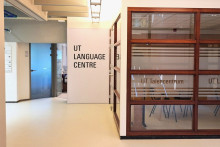In your opinion, what are the main conclusions of the evaluation of the language policy plan?
Hunfeld: ‘The good news is that language remains a focal point at the UT. We see that we still need to pay attention to language development – and the Executive Board is eager to support this, which is great. The bad news is that some things were put on ice because of the pandemic. The language policy certainly wasn’t the primary topic, also not on the national level, but the interest is coming back now.’
Were there any specific plans that you had to put on hold because of Covid?
‘For example, as the Language Centre we aimed to asses how programmes build in language skills into their curricula. However, the programmes had many other things to worry about and so we couldn’t focus on this. On the other hand, we do see that programmes have been increasing the number of new modules focused on academic communication skills. That is a very positive development.’
Based on your experience, how has the language culture at the UT changed since the implementation of the language policy in 2018? What type of signals have you and your colleagues picked up on?
‘We see an increased interest in Dutch. There is a lot of interest in retaining international talent in the region. One of the major issues that internationals encounter when searching for a job here is the language. The UT of course offers Dutch courses for internationals, but they need specific skills. However, students are already very busy and don’t have time to take courses in the evening, for example. That is why we are busy with developing a minor to see if we can teach Dutch as part of the regular curriculum. There should be a pilot of this minor ready in the next academic year.
If it comes to Dutch, we also get requests from Dutch native speakers, such as students who notice that they struggle with writing official documents in Dutch because their academic environment is all in English. We get the same signals from staff members who have troubles with writing in Dutch, because they have focused on English so much. That is a consequence of the language policy that nobody saw coming.’
What is your main recommendation for the UT and the UT community in terms of the language policy?
‘I always say that people should be pragmatic about it. When the language policy was first introduced, there were many reactions and criticism about the university switching to English. The reactions were very emotional, but now you see that people find a way to deal with it in a pragmatic way. You need to shape it to fit your needs. It’s all about reaching people. That is also why we still do corporate communication bilingually. We see that other universities are also busy with changing their language policies. We should look at our policy again and see if we perhaps need to tweak it a bit. Maybe we should consider including multilingualism as an important aspect. We can use the full richness we have on campus – with all its languages.’








